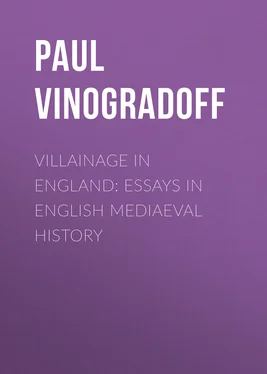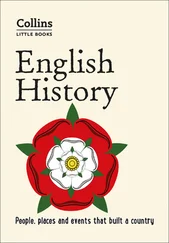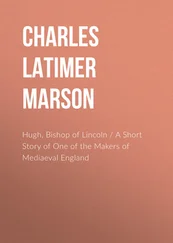Paul Vinogradoff - Villainage in England - Essays in English Mediaeval History
Здесь есть возможность читать онлайн «Paul Vinogradoff - Villainage in England - Essays in English Mediaeval History» — ознакомительный отрывок электронной книги совершенно бесплатно, а после прочтения отрывка купить полную версию. В некоторых случаях можно слушать аудио, скачать через торрент в формате fb2 и присутствует краткое содержание. Жанр: foreign_prose, Юриспруденция, История, foreign_edu, foreign_antique, на английском языке. Описание произведения, (предисловие) а так же отзывы посетителей доступны на портале библиотеки ЛибКат.
- Название:Villainage in England: Essays in English Mediaeval History
- Автор:
- Жанр:
- Год:неизвестен
- ISBN:нет данных
- Рейтинг книги:4 / 5. Голосов: 1
-
Избранное:Добавить в избранное
- Отзывы:
-
Ваша оценка:
- 80
- 1
- 2
- 3
- 4
- 5
Villainage in England: Essays in English Mediaeval History: краткое содержание, описание и аннотация
Предлагаем к чтению аннотацию, описание, краткое содержание или предисловие (зависит от того, что написал сам автор книги «Villainage in England: Essays in English Mediaeval History»). Если вы не нашли необходимую информацию о книге — напишите в комментариях, мы постараемся отыскать её.
Villainage in England: Essays in English Mediaeval History — читать онлайн ознакомительный отрывок
Ниже представлен текст книги, разбитый по страницам. Система сохранения места последней прочитанной страницы, позволяет с удобством читать онлайн бесплатно книгу «Villainage in England: Essays in English Mediaeval History», без необходимости каждый раз заново искать на чём Вы остановились. Поставьте закладку, и сможете в любой момент перейти на страницу, на которой закончили чтение.
Интервал:
Закладка:
The term nativus has a similar sense. But the relation between it and villanus is not constant; sometimes this latter marks the genus, while the former applies to a species; but sometimes they are used interchangeably 256 256 Rot. Hundred. ii. 528, a: 'Henr. de Walpol habet latinos ( corr. nativos ), qui tenent 180 acras terre et redd. 10 libr. et 8 sol. et 4 d. et ob. Nomina eorum qui tenent de Henrico de Walpol in villenagio .' Chapter House, County Boxes, Salop. 14, c: 'Libere tenentes … Coterelli … Nativi.'
, and the feminine for villain is nieve ( nativa ). But while villanus is made to appear both in a wide and in a restricted sense, and for this reason cannot be used as a special qualification, nativus has only the restricted sense suggesting status 257 257 Hale, in his Introduction to the Domesday of St. Paul's, xxiv, speaks of the 'nativi a principio' of Navestock, and distinguishes them from the villains. 'The ordinary praedial services due from the tenentes or villani were not required to be performed in person, and whether in the manor or out of it the villanus was not in legal language "sub potestate domini." Not so the nativus.' Hale's explanation is not correct, but the twofold division is noticed by him.
. In connection with other denominations nativus is used for the personally unfree 258 258 Domesday of St. Paul's, 157 (Articuli visitationis): 'An villani sive custumarii vendant terras. Item, an nativi custumarii maritaverunt filias—vel vendiderint vitulum—vel arbores—succidant.' A Suffolk case is even more clear. Registrum cellararii of Bury St. Edmunds, Cambridge University Gg. iv. 4, f. 30, b: 'Gersumarius vel custumarius qui nativus est.... Antecessor recognovit se nativum domini abbatis in curia domini regis.'
. When we find nativus domini , the personal relation to the lord is especially noticed 259 259 Cartulary of Eynsham in Oxfordshire, MS. of the Chapter of Christ Church in Oxford, N. 27, p. 25, a: 'In primis Willelmus le Brewester nativus domini tenet de dictis prato et terris…'
. The sense being such, no wonder that the nature of the tenure is sometimes described in addition 260 260 Eynsham Cartulary, 49. b: 'Johannes Kolyns nativus domini tenet 1 virgatam terre cum pertinenciis in bondagio.'
. Of course, the primary meaning is, that a person has been born in the power of the lord, and in this sense it is opposed to the stranger— forinsecus , extraneus 261 261 Cartulary of St. Mary of Worcester (Camden Series), 15. a: 'Nativi, cum ad aetatem pervenerint nisi immediate serviant patri—faciant 4 benripas et forinsici similiter.' Survey of Okeburn, Q.R. Anc. Miscell. Alien Priories, 2/2: 'Aliquis nativus non potest recedere sine licencia neque catalla amovere nec extraneus libertatem dominorum ad commorandum ingrediat sine licentia.'
. In this sense again the Domesday of St. Paul's speaks of 'nativi a principio' in Navestock 262 262 Domesday of St. Paul's, 80: 'Nativi a principio. Isti tenent terras operarias.'
. But the fact of being born to the condition supposes personal subjection, and this explains why nativi are sometimes mentioned in contrast with freemen 263 263 Queen's Remembrancer's Miscellanies, 902-62: 'Rotuli de libertate de Tynemouth, de liberis hominibus, non de nativis.'
, without any regard being paid to the question of tenure. Natives, or villains born, had their pedigrees as well as the most noble among the peers. Such pedigrees were drawn up to prevent any fraudulent assertion as to freedom, and to guide the lord in case he wanted to use the native's kin in prosecution of an action de nativo habendo . One such pedigree preserved in the Record Office is especially interesting, because it starts from some stranger, extraneus 264 264 Queen's Remembrancer's Miscellanies, 902-77: 'Nativi de Sebrighteworth (Proavus extraneus).' See App. X.
, who came into the manor as a freeman, and whose progeny lapses into personal villainage; apparently it is a case of villainage by prescription.
Free men holding villain land.
The other subdivision of the class—freemen holding unfree land 265 265 Warwickshire Hundr. Roll, Queen's Remembrancer's Miscellaneous Books, 29, 19, b: 'Johannes le Clerc tenet 1 virg. terre pro eodem sed est libere condicionis.' Augment. Off., Duchy of Lancaster, Court Rolls, Bundle 32, 283: 'Unum mesuagium et 19 acre terre in Holand que sunt in manu domini per mortem W. qui eas tenuit in bondagio. Ipse fuit liber, quia natus fuit extra libertatem domini.'
—has no special denomination. This deprives us of a very important clue as to the composition of the peasantry, but we may gather from the fact how very near both divisions must have stood to each other in actual life. The free man holding in villainage had the right to go away, while the native was legally bound to the lord; but it was difficult for the one to leave land and homestead, and it was not impossible for the other to fly from them, if he were ill-treated by his lord or the steward. Even the fundamental distinction could not be drawn very sharply in the practice of daily life, and in every other respect, as to services, mode of holding, etc., there was no distinction. No wonder that the common term villanus is used quite broadly, and aims at the tenure more than at personal status.
Terms to indicate economic condition.
Terms which have in view the general economic condition of the peasant, vary a good deal according to localities. Even in private documents they are on the whole less frequent than the terms of the first class, and the Hundred Rolls use them but very rarely. It would be very wrong to imply that they were not widely spread in practice. On the contrary, their vernacular forms vouch for their vitality and their use in common speech. But being vernacular and popular in origin, these terms cannot obtain the uniformity and currency of literary names employed and recognised by official authority. The vernacular equivalent for villanus seems to have been niet or neat 266 266 Glastonbury Inquisitions of 1189 (Roxburghe Series), 48: 'Radulfus niet tenet dimidiam virgatam.'
. It points to the regular cultivators of the arable, possessed of holdings of normal size and performing the typical services of the manor 267 267 Glastonbury Inquis. (Roxburghe Series), 26: 'Rogerus P. tenet virg. terre: pro una medietate dat. xxx d. et pro alia medietate operatur sicut neth et seminat dimidiam acram pro churset et dat hueortselver.' Ibid. 22: 'Osbertus tenet 1 virgatam terre medietatem pro ii sol. et dono et pro alia medietate operatur quecumque jussus fuerit sicut neth.' Cartulary of Abingdon (Rolls Series), ii. 304: 'Illi sunt neti de villa. Aldredus de Brueria 5 sol. pro dimidia hida et arat et varectat et seminat acram suo semine et trahit foenum et bladum.' Ibid. ii. 302: 'Bernerius et filius suus tenent unam cotsetland unde reddunt cellario monachorum 6 sestaria mellis et camerae 31 d.'—' De netis. Robertus tenet dimidiam hidam unde reddit 5 sol. et 3 den. et arabit acram et seminabit semine suo et trahet foenum et bladum. Hoc de netis.'
. The peasant's condition is here regarded from the economical side, in the mutual relation of tenure and work, not in the strictly legal sense, and men of this category form the main stock of the manorial population. The Rochester Custumal says 268 268 Black Book of Rochester Cathedral (ed. Thorpe), 10, a: 'Consuetudines de Hedenham et de Cudintone. Dominus potest ponere ad opera quemcumque voluerit de netis suis in die St. Martini. Et sciendum quod neti idem sunt quod Neiatmen qui aliquantulum liberiores sunt quam cotmen, qui omnes habent virgatas ad minus.'
that neats are more free than cottagers, and that they hold virgates. The superior degree of freedom thus ascribed to them is certainly not to be taken in the legal sense, but is merely a superiority in material condition. The contrast with cottagers is a standing one 269 269 Cartulary of Shaftesbury, Harl. MSS. 61, f. 60: 'Et habebit unum animal quietum in pastura, si est net, et de aliis herbagium. Et si idem fuerit cotsetle debet operari 2 diebus.' Ibid. 59: 'Tempore Henrici Regis fuerunt in T. 18 Neti sed modo non sunt nisi 11 et ex 7 qui [non] sunt Nicholaus tenet terram [trium] et 4 sunt in dominico; et 7 cotmanni fuerunt tempore Henrici Regis qui non sunt modo, quorum trium tenet terram Nicholaus et 4 sunt in dominico.' Ibid. 65: 'Cotsetle … debet metere quantum unus nieth … et debet collocare messem vel … aliud facere … dum Neth messem attrahat … pannagium sicut Neth.' Ibid. 89: 'Si moriatur cotsetle pro diviso dabit 12 d. et vidua tenebit pro illo id divisum tota vita sua. Si moriatur neatus dabit melius catellum et pro hoc tenebit quietus.'
, and, being the main population of the village, neats are treated sometimes as if they were the only people there 270 270 Glastonbury Inquis. 51: 'Et nieti tenent 9 acras unde reddunt 3 s.' Ibid. 47: 'Nieti habent unum pratum pro 5 s.'
. The name may be explained etymologically by the Anglo-Saxon geneat , which in documents of the tenth and eleventh century means a man using another person's land. The differences in application may be discussed when we come to examine the Saxon evidence.
Интервал:
Закладка:
Похожие книги на «Villainage in England: Essays in English Mediaeval History»
Представляем Вашему вниманию похожие книги на «Villainage in England: Essays in English Mediaeval History» списком для выбора. Мы отобрали схожую по названию и смыслу литературу в надежде предоставить читателям больше вариантов отыскать новые, интересные, ещё непрочитанные произведения.
Обсуждение, отзывы о книге «Villainage in England: Essays in English Mediaeval History» и просто собственные мнения читателей. Оставьте ваши комментарии, напишите, что Вы думаете о произведении, его смысле или главных героях. Укажите что конкретно понравилось, а что нет, и почему Вы так считаете.












